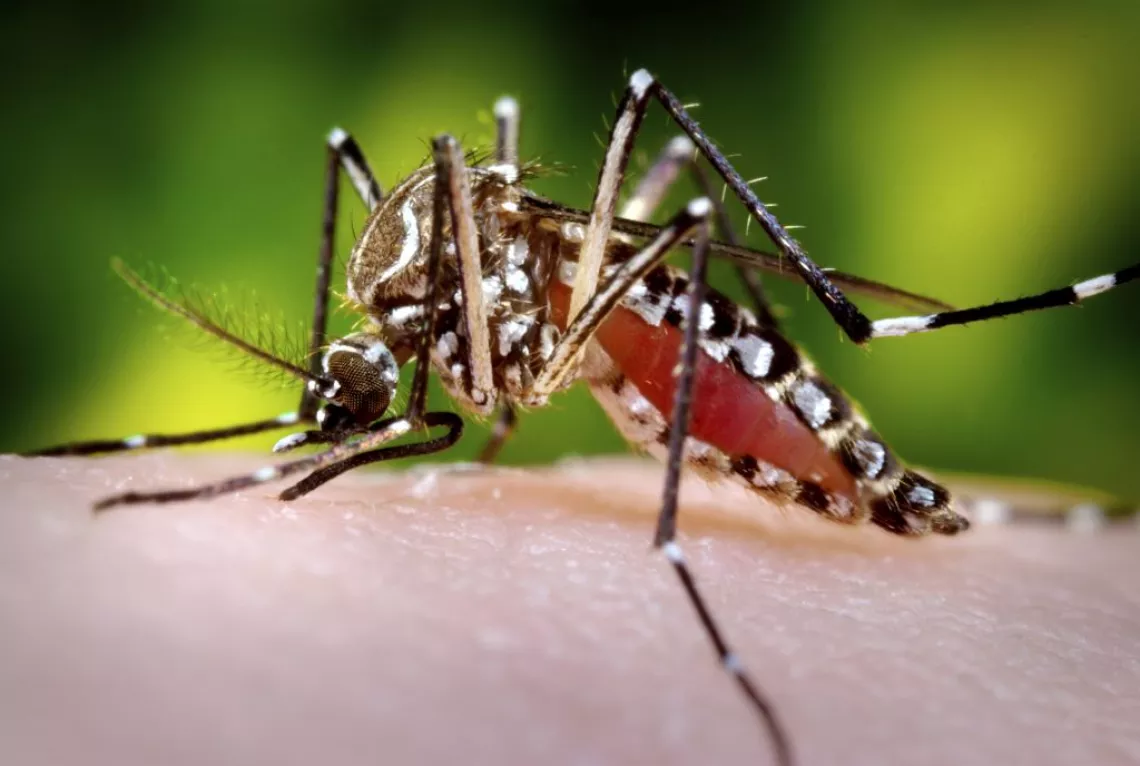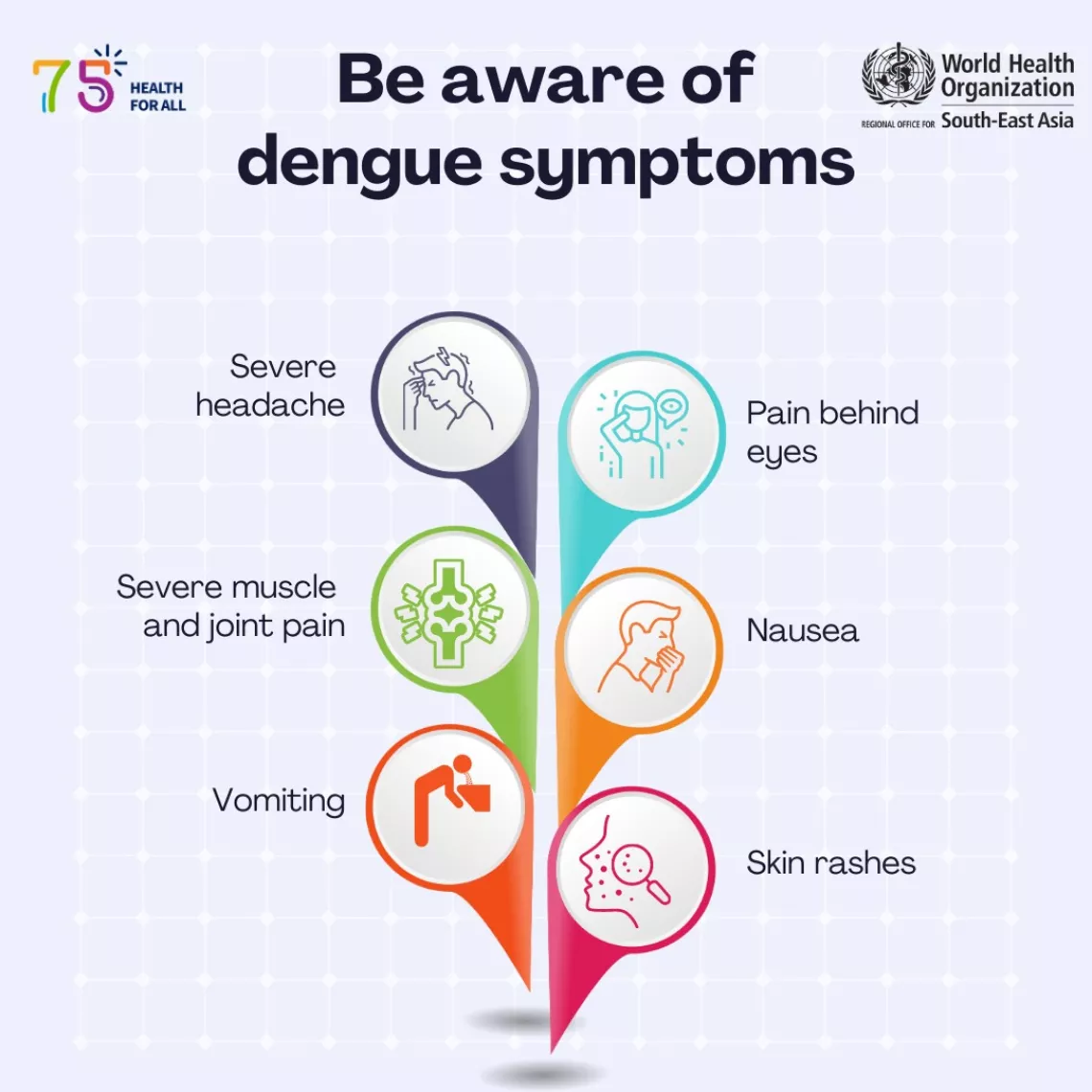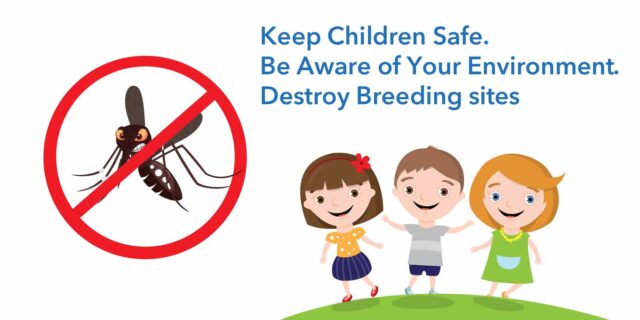What is dengue?
Dengue is a flu-like disease spread by Aedes mosquitoes.
Most people infected with dengue have no symptoms. But it can cause a feverish illness and in rare cases people can become seriously unwell, need hospital care and even die from dengue.

How do you catch dengue?
You get dengue by being bitten by an Aedes mosquito that is infected with the dengue virus.
Aedes mosquitoes normally bite during the day, especially 2 hours after sunrise and just before sunset — so you’re at the biggest risk of getting bitten and infected with dengue during these times.
You are also at a bigger risk if you have objects containing water or collecting rainwater around your home, neighbourhood and place where you work or study (or on your journey there).
This is because the Aedes mosquito breeds in water and can lay eggs even in a very small amount of water. For example, buckets, old car tyres, puddles and even bottle tops.
Dengue does not spread from person to person directly. But, if a person has dengue, the virus will be in their blood during the first week they’re infected. If a mosquito bites them during this time the mosquito will become infected with dengue. This infected mosquito can then spread the virus to other people through bites.
It’s also possible for pregnant women with dengue to pass it to their babies during pregnancy or around the time of birth.
How do I know if I or my child has dengue?
It can be hard to know if you have dengue, because most people infected with dengue don’t have any symptoms.
If children have symptoms of dengue, they can look similar to other common childhood infections.
Most people with dengue have mild or no symptoms and will get better in 1–2 weeks. About 1 in 4 people with dengue will develop symptoms. If you do show symptoms, they will usually begin 4–10 days after being bitten by an infected mosquito and last for 2–7 days.
Symptoms of dengue may include:
- A sudden high fever, of up to 40°C
- Severe headache
- Pain behind the eyes
- muscle and joint pains
- Nausea
- Vomiting
- Swollen glands
- Skin rash
Children and infants with dengue may also become more irritable than usual and their appetite and sleep patterns may change.
Dengue can look very similar to other diseases like zika, chikungunya and malaria. Because many people with dengue have no, or mild symptoms, cases are also often misdiagnosed as other illnesses. The only way to know for sure if you have dengue is through a laboratory test.
If you, or your child, have any symptoms of dengue, seek medical attention and do as advised.

What is the best way to treat mild dengue?
There is no specific treatment for dengue infection. Medical treatments of dengue are essentially just treatments to manage the symptoms. For example, medicines to treat fever and pain.
Most people with mild dengue infections can be treated at home with pain medicine, like paracetamol, and won’t need medical intervention. They will gradually return to normal little by little.
If you, or your child, are diagnosed with mild dengue:
- Rest.
- Drink lots of water, to stay hydrated.
- Eat nutritious food.
- You can take paracetamol to help with pain and fever, as recommended by your health professional.
- Sponge the skin with cool water to reduce fever.
- Avoid non-steroidal anti-inflammatory drugs, like ibuprofen and aspirin, as they can increase the risk of bleeding.
- Watch for severe symptoms and contact your doctor as soon as possible if you notice any.
Symptoms of dengue can become severe within a few hours. If you, or your child, develops any symptoms of severe dengue, seek urgent medical attention immediately.
How do I know if my child needs urgent medical attention?
Some people do become seriously unwell with dengue. Young children, pregnant women and older people with other health conditions (like kidney disease and diabetes) are at the highest risk.
When a dengue infection develops into severe dengue it can happen quickly and lead to life-threatening complications. So, it’s important to pay attention to children’s symptoms and act quickly to get medial help if they develop.
Severe dengue symptoms often come after fever has gone away and include:
- Severe abdominal pain
- Persistent vomiting
- Rapid breathing
- Bleeding gums or nose
- Fatigue
- Restlessness
- Blood in vomit or stool
- Being very thirsty
- Pale and cold skin
- Feeling weak
- Sleepiness, lack of energy, or irritability
If your child, or anyone with suspected dengue develops any of these symptoms, it is important to seek urgent medical attention.
People with severe dengue often need hospitalization.
It’s also important to look out for signs of dehydration in children. Dehydration happens when the body loses too much fluid due to fever, vomiting, diarrhoea or not drinking enough fluids.
Signs of dehydration in children include:
- Unusually sleepy, lack of energy, very fussy.
- Dry mouth, tongue, lips.
- Fast breathing.
- Sunken eyes.
- Few or no tears when crying.
- Cool, discoloured hands or feet.
- Urinates less often.
- Urine is dark yellow and strong smelling.
If your child develops any of these signs of dehydration seek medical care immediately. watch video
